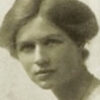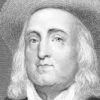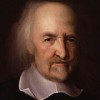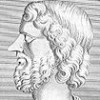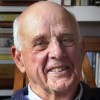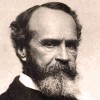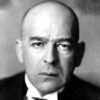Oh, if at every moment of our lives we could know the consequences of some of the utterings, thoughts and deeds that seem so trivial and unimportant at the time! And should we not conclude from such examples that there is no such thing in life as unimportant moments devoid of meaning for the future?
Isabelle Eberhardt (1877-1904) Swiss-Russian explorer and author [Si Mahmoud Saadi]
The Passionate Nomad: The Diary of Isabelle Eberhardt , “26 November 1901” (1987)[tr. de Voogd]
(Source)
Quotations about:
effect
Note not all quotations have been tagged, so Search may find additional quotes on this topic.
The more articulate one is, the more dangerous words become.
May Sarton (1912-1995) Belgian-American poet, novelist, memoirist [pen name of Eleanore Marie Sarton]
Journal of a Solitude, “September 16th” (1973)
(Source)
As to the evil which results from a censorship, it is impossible to measure it, because it is impossible to tell where it ends.
Jeremy Bentham (1748-1832) English jurist and philosopher
“Principles of the Penal Code,” ch. 3, Theory of Legislation (1802)
(Source)
Ignorance of remote causes disposeth men to attribute all events to the causes immediate and instrumental: for these are all the causes they perceive.
You both seem concern’d lest I have imbib’d some erroneous Opinions. Doubtless I have my Share, and when the natural Weakness and Imperfection of Human Understanding is considered, with the unavoidable Influences of Education, Custom, Books and Company, upon our Ways of thinking, I imagine a Man must have a good deal of Vanity who believes, and a good deal of Boldness who affirms, that all the Doctrines he holds, are true; and all he rejects, are false. And perhaps the same may be justly said of every Sect, Church and Society of men when they assume to themselves that Infallibility which they deny to the Popes and Councils. I think Opinions should be judg’d of by their Influences and Effects; and if a Man holds none that tend to make him less Virtuous or more vicious, it may be concluded he holds none that are dangerous; which I hope is the Case with me.
Benjamin Franklin (1706-1790) American statesman, scientist, philosopher, aphorist
Letter to Josiah and Abiah Franklin (13 Apr 1738)
(Source)
His parents.
If it be true, that men are miserable because they are wicked, it is likewise true, that many are wicked because they are miserable.
Samuel Taylor Coleridge (1772-1834) English poet and critic
Aids to Reflection, “Prudential Aphorisms II” (1831 ed.)
(Source)
Every man is a consumer, and ought to be a producer. He fails to make his place good in the world, unless he not only pays his debt, but also adds something to the common wealth.
Ralph Waldo Emerson (1803-1882) American essayist, lecturer, poet
“Wealth,” The Conduct of Life, ch. 3 (1860)
(Source)
A teacher’s major contribution may pop out anonymously in the life of some ex-student’s grandchild.
Wendell Berry (b. 1934) American farmer, educator, poet, conservationist
“Wallace Stegner and the Great Community,” What Are People For? (1990)
(Source)
You never can tell when you do an act
Just what the result will be;
But with every deed you are sowing a seed,
Though the harvest you may not see.Ella Wheeler Wilcox (1850-1919) American author and poet.
“You Never Can Tell,” Custer And Other Poems (1896)
(Source)
The only things in which we can be said to have any property are our actions. Our thoughts may be bad, yet produce no poison; they may be good, yet produce no fruit. Our riches may be taken away from us by misfortune, our reputation by malice, our spirits by calamity, our health by disease, our friends by death. But our actions must follow us beyond the grave; with respect to them alone, we can not say that we shall carry nothing with us when we die, neither that we shall go naked out of the world.
Charles Caleb "C. C." Colton (1780-1832) English cleric, writer, aphorist
Lacon: Or, Many Things in Few Words, Vol. 1, § 52 (1820)
(Source)
The presidency has made every man who occupied it, no matter how small, bigger than he was; and no matter how big, not big enough for its demands.
Lyndon B. Johnson (1908-1973) American politician, educator, US President (1963-69)
Proclamation 3489, “Commemoration of the Beginnings of the Office of the Presidency of the United States” (1964-04-30)
(Source)
On the 175th anniversary of George Washington taking the first oath of office as President.
The hell to be endured hereafter, of which theology tells, is no worse than the hell we make for ourselves in this world by habitually fashioning our characters in the wrong way. Could the young but realize how soon they will become mere walking bundles of habits, they would give more heed to their conduct while in the plastic state. We are spinning our own fates, good or evil. Every smallest stroke of virtue or of vice leaves its never so little scar.
William James (1842-1910) American psychologist and philosopher
The Principles of Psychology, Vol. 1, ch. 4 “Habit” (1890)
(Source)
This chapter originally published in Popular Science Monthly (Feb 1887).
Everyone must leave something behind when he dies, my grandfather said. A child or a book or a painting or a house or a wall built or a pair of shoes made. Or a garden planted. Something your hand touched some way so your soul has somewhere to go when you die, and when people look at that tree or that flower you planted, you’re there. It doesn’t matter what you do, he said, so as long as you change something from the way it was before you touched it into something that’s like you after you take your hands away.
Ray Bradbury (1920-2012) American writer, futurist, fabulist
Fahrenheit 451, ch. 3 [Granger] (1953)
(Source)

